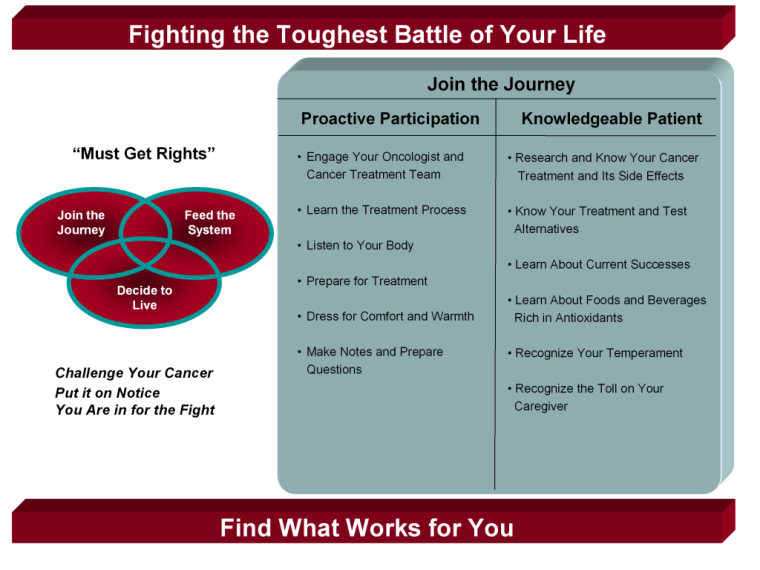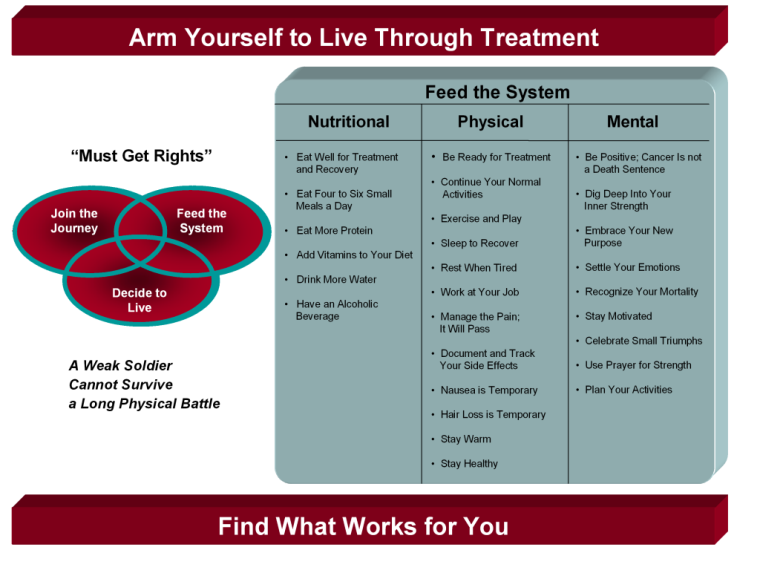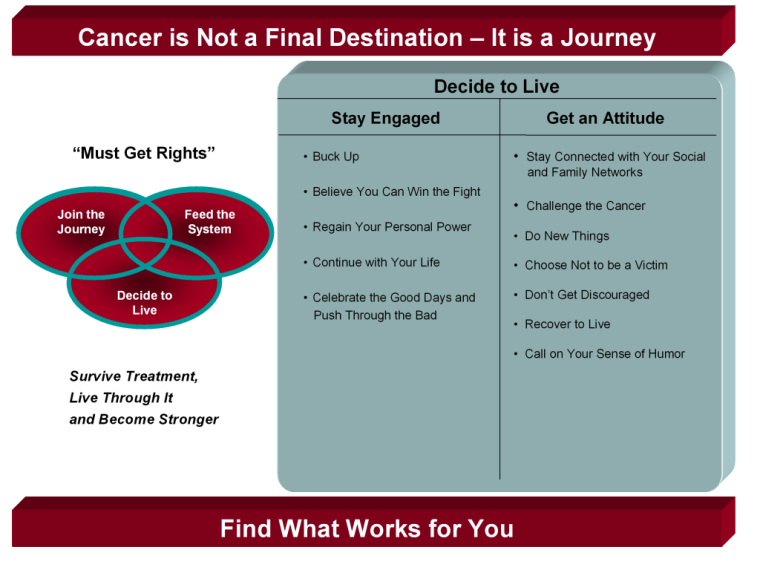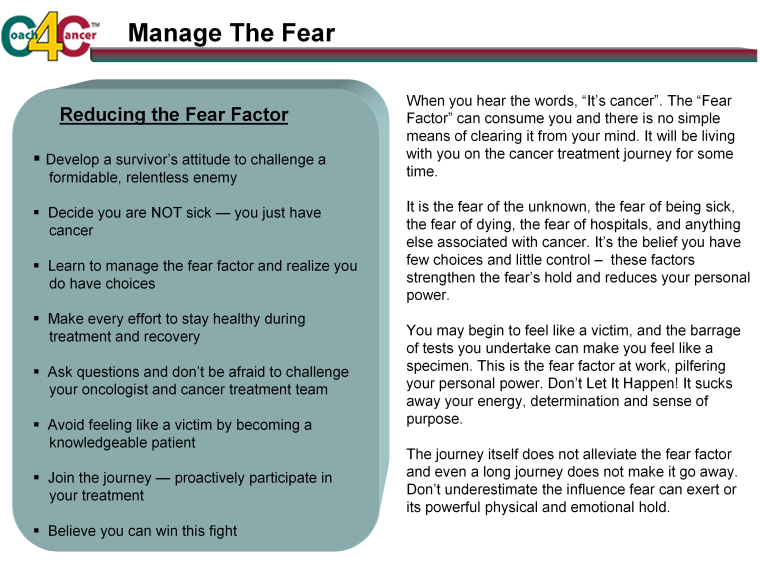Every cancer has a survival rate. Before you begin treatment, prepare to devote every ounce of your energy to proactive participation in your treatment program. Be aggressive from the moment you are diagnosed. Get into an attack mode and begin the treatment process focused. There are three Must Get Rights principles supported by concepts for the cancer patient to use during their journey.
"Must Get Rights"
|  |
|
|

Join the Journey — The moment you join the journey you begin to participate. You begin to challenge your cancer and put it on notice you’re in for the fight. That’s when you begin to reclaim your personal power and subdue the fear factor. The journey will become more difficult as treatment progresses and fatigue sets in. Know this: Every day will not be good, especially the days you receive bad news, but be positive — you are not dying yet. Research your cancer and know your enemy. Learn as much as you can about treatment and its side effects. Engage your oncologist and treatment team and be prepared to ask questions and communicate with them. They will help you win this fight but you have to do your part. The more you know the more proactive you will become.
Feed the System — Cancer treatment engages your body in the worst physical battle it may ever endure. A weak soldier cannot survive a long physical battle. Stay strong during treatment and recovery. Feed the system the appropriate nutrition, as well as a balanced diet of physical and mental activity. This is the most difficult Must Get Rights principle because the treatment process works against you and your ability to feed the system. As treatment wears you down, fatigue sets in and you lose your appetite. You don’t feel like doing anything and don’t think clearly. As the side effects begin to take their toll, your fatigue makes them stronger, and it becomes even more difficult to be proactive and feed the system. This is when you must buck up and push through.
Decide to Live — When you where diagnosed with cancer, you didn’t decide to die, but you probably didn’t decide to live either. When you decide to live, you make a conscious decision to not just survive treatment but to live through it and become stronger because of it. Cancer is not a death sentence. You will know when you are dying and you’re not dying yet. You have to believe you will win this fight. Continue to live your life during treatment. Stay engaged with your work, social network, family and friends. There will be times when you feel you’ve had enough, can’t take any more or go any further. This is when you must dig deep into your inner strength to meet the challenge, push through and decide to live.

Find What Works for You
It’s critical to have confidence in your oncologist and believe this is the person you want in the trench fight with you. If you don’t like the way your cancer team treats you, let it know how you feel. If things don't improve, change teams. You are not a hostage. If you think you need a second opinion about a treatment, test, surgery or anything concerning your cancer, then get one. If you don’t speak up you may not like where you end up.
When I was diagnosed and informed of the treatment regimen, Linda felt I should get a second opinion.
When it was time to select a surgeon, Linda and I again disagreed about getting a second opinion. I agreed to see another surgeon who had a very different surgical approach to removing the tumor and my esophagus. I’m glad I got a second opinion so I knew my alternatives.
Stay focused. You’re in a battle for your life as the journey takes you through treatment and its regimens. Approach it with a passion and be intent on winning. What helped me stay focused was wearing a yellow Lance Armstrong Foundation Livestrong bracelet.
The only time I’ve ever taken it off was when the surgical prep team had me remove it before surgery. I still wear the bracelet today because it reminds me of the journey and how far I’ve come since putting it on. It works for me.

Find What Works for You
The Feed the System challenge is to find what works for you from a combination of nutritional, physical and mental concepts that can beef-up your system. It demands you and your caregiver participate in the process at the highest possible level. The more involved you are, the sooner you’ll find what works for you, including the foods you eat, the vitamins you take, your exercise routine, what you do to stay active and engaged and how much sleep you need, to mention a few. You may find what doesn’t work more quickly than what does so work at it and don’t get discouraged.
Linda and I found many things that worked for
When my blood count was low, we learned what foods and vitamins helped build red blood cells. When my side effects or pain increased, we added two cups of apple cider vinegar to a hot bath. Talking with good friends, my kids and Linda about how I felt greatly improved my focus and motivation. These remedies were inexpensive, did not compromise my immune system and worked for me.

Find What Works for You
Decide to Live and you decide not to let cancer
take over your life. How you decide to live with
cancer is your choice, and the decision will return your personal power. Find what works for you.
Several things worked for me and the first was music. I assembled specific groups of songs by various artists who I felt depicted my point of view and attitude about cancer:
“It’s a Great Day to be Alive” by Travis Tritt
“Center Field” by John Fogerty
“Shape I’m In” by the Arc Angels
“How Sweet It Is” by James Taylor
The song I heard in my head most often was “Center Field,” specifically the verse, “Put me in
The second thing that worked for me was my attitude that I wasn’t dying; I just had cancer. It sounded like a country-western song, but it worked for me.
The third and most important thing was my sense of humor. It helped me get through treatment when things were really rough.
Decide to Live and you establish a mindset that makes a difference and provides the motivation and strength you need to get through treatment.

Find the Humor
Let your sense of humor ease the treatment torment during the long journey and help subdue the fear factor. Cancer centers, infusion, radiation, CT and PET scan rooms may not seem conducive to humor, but in many situations, the treatment process is ripe for humor and laughter. Use your humor to change your point of view.
Good Things About Cancer Treatment
There must be something good about cancer treatment.
- Mosquitoes and chiggers won’t bite you when you're on chemo
- Chemotherapy is a hell of a weight loss program
- You don’t have to shave … anywhere
- A bald head is easy to dry after a shower
- You may qualify for a handicap parking permit
- It’s the only time you can legally get on steroids
- You can eat food you dislike because you can’t taste it
- Radiation gives you that warm inner feeling and sunburn
- You can blame everything bad on cancer treatment
Sense of Humor Responses
The cancer treatment process is ripe for politically incorrect humor. The following are various responses and comments used during the treatment process.
Chemotherapy Treatment
|
Radiation Treatment
CT and Pet Scans
|